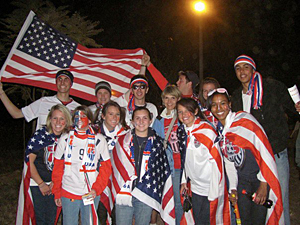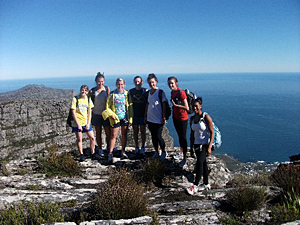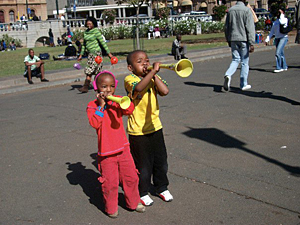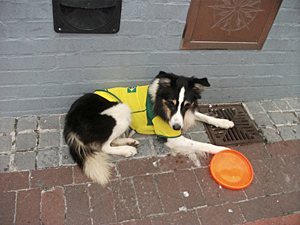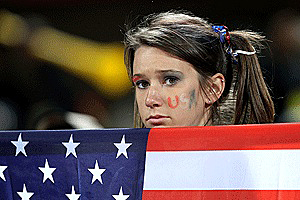
ADVERTISEMENT
- Rozovsky wins prestigious NSF Early Career Award
- UD students meet alumni, experience 'closing bell' at NYSE
- Newark Police seek assistance in identifying suspects in robbery
- Rivlin says bipartisan budget action, stronger budget rules key to reversing debt
- Stink bugs shouldn't pose problem until late summer
- Gao to honor Placido Domingo in Washington performance
- Adopt-A-Highway project keeps Lewes road clean
- WVUD's Radiothon fundraiser runs April 1-10
- W.D. Snodgrass Symposium to honor Pulitzer winner
- New guide helps cancer patients manage symptoms
- UD in the News, March 25, 2011
- For the Record, March 25, 2011
- Public opinion expert discusses world views of U.S. in Global Agenda series
- Congressional delegation, dean laud Center for Community Research and Service program
- Center for Political Communication sets symposium on politics, entertainment
- Students work to raise funds, awareness of domestic violence
- Equestrian team wins regional championship in Western riding
- Markell, Harker stress importance of agriculture to Delaware's economy
- Carol A. Ammon MBA Case Competition winners announced
- Prof presents blood-clotting studies at Gordon Research Conference
- Sexual Assault Awareness Month events, programs announced
- Stay connected with Sea Grant, CEOE e-newsletter
- A message to UD regarding the tragedy in Japan
- More News >>
- March 31-May 14: REP stages Neil Simon's 'The Good Doctor'
- April 2: Newark plans annual 'wine and dine'
- April 5: Expert perspective on U.S. health care
- April 5: Comedian Ace Guillen to visit Scrounge
- April 6, May 4: School of Nursing sponsors research lecture series
- April 6-May 4: Confucius Institute presents Chinese Film Series on Wednesdays
- April 6: IPCC's Pachauri to discuss sustainable development in DENIN Dialogue Series
- April 7: 'WVUDstock' radiothon concert announced
- April 8: English Language Institute presents 'Arts in Translation'
- April 9: Green and Healthy Living Expo planned at The Bob
- April 9: Center for Political Communication to host Onion editor
- April 10: Alumni Easter Egg-stravaganza planned
- April 11: CDS session to focus on visual assistive technologies
- April 12: T.J. Stiles to speak at UDLA annual dinner
- April 15, 16: Annual UD push lawnmower tune-up scheduled
- April 15, 16: Master Players series presents iMusic 4, China Magpie
- April 15, 16: Delaware Symphony, UD chorus to perform Mahler work
- April 18: Former NFL Coach Bill Cowher featured in UD Speaks
- April 21-24: Sesame Street Live brings Elmo and friends to The Bob
- April 30: Save the date for Ag Day 2011 at UD
- April 30: Symposium to consider 'Frontiers at the Chemistry-Biology Interface'
- April 30-May 1: Relay for Life set at Delaware Field House
- May 4: Delaware Membrane Protein Symposium announced
- May 5: Northwestern University's Leon Keer to deliver Kerr lecture
- May 7: Women's volleyball team to host second annual Spring Fling
- Through May 3: SPPA announces speakers for 10th annual lecture series
- Through May 4: Global Agenda sees U.S. through others' eyes; World Bank president to speak
- Through May 4: 'Research on Race, Ethnicity, Culture' topic of series
- Through May 9: Black American Studies announces lecture series
- Through May 11: 'Challenges in Jewish Culture' lecture series announced
- Through May 11: Area Studies research featured in speaker series
- Through June 5: 'Andy Warhol: Behind the Camera' on view in Old College Gallery
- Through July 15: 'Bodyscapes' on view at Mechanical Hall Gallery
- More What's Happening >>
- UD calendar >>
- Middle States evaluation team on campus April 5
- Phipps named HR Liaison of the Quarter
- Senior wins iPad for participating in assessment study
- April 19: Procurement Services schedules information sessions
- UD Bookstore announces spring break hours
- HealthyU Wellness Program encourages employees to 'Step into Spring'
- April 8-29: Faculty roundtable series considers student engagement
- GRE is changing; learn more at April 15 info session
- April 30: UD Evening with Blue Rocks set for employees
- Morris Library to be open 24/7 during final exams
- More Campus FYI >>
2:37 p.m., July 20, 2010----The 12 University of Delaware students who spent five weeks in South Africa during the 2010 World Cup all had life-changing experiences during their travels, but when they returned to the U.S., everyone asked them the same question: “Did you bring back a vuvuzela?”
Most of them did, but for these sport-loving students, the trip was about much more than the colorful plastic horns that provided a buzzing backdrop for the 64 matches of the tournament. It was about playing with AIDS orphans and helping kids plant a kitchen garden for their school. It was about touring the prison at Robben Island and taking a three-day safari at Madikwe. It was about hiking Table Mountain and learning to surf.
But most of all, it was about soccer and what the World Cup means to the 3.5 billion people around the globe who play or follow “football” -- and we're not talking about the version played by the NFL.
“As a lifelong soccer player and fan, seeing the United States play Ghana in the World Cup was a dream come true for me,” said Jason Kremer, a junior with a double major in accounting and finance. “Even though we were surrounded by thousands of Ghanaian fans, you could still see the support of the U.S. team. I'm glad I was able to experience this with my fellow students from UD because I could share their passion for the sport, the team and America.”
Led by Steve Goodwin, associate professor in UD's Department of Behavioral Health and Nutrition, the program included two courses: History of the World Cup and South African Sport, Recreation, and Leisure.
“We learned a lot about the teams and the individual players in the history class, which helped us get into watching the games and picking favorites to win,” said Christine Kukich, a senior majoring in health behavior science. “And since there were only 12 in the group, the class was small enough for us to have good discussions about the social, political, and economic issues associated with the World Cup.”
The other course encouraged students to “step outside their comfort zone and challenge themselves,” keeping a journal about their experiences.
Allison McCague, a junior biology major and Honors Program student, wrote, as part of the final entry in her journal: “This trip was about so much more than soccer, even though that happened to be the thing that brought us all here. It was about experiencing South Africa, a nation I have fallen in love with during my time here.
“I could never have predicted all the amazing people I would get to meet and talk to. We saw the horrors of apartheid and the triumphs of Nelson Mandela and the new South Africa. We heard the stories of children who have to work to get food, who have lost both of their parents to AIDS, but still face every day with a smile on their faces because what else can they do, but simply be children in spite of it all?
“The World Cup brings people together, fostering a kind of common humanity that I was beginning to wonder if the world had lost. But it has not. I found it here in South Africa.”
The students faced many challenges, including spending a month in cold weather without heat, traveling on buses and planes for close to 100 hours, being stranded on the side of the road when their bus broke down after the U.S. loss to Ghana in Rustenburg, and living without services that Americans take for granted, like running water and electricity.
They all learned that they could endure these “hardships” because the experiences paled in comparison to those of political prisoners and hungry children. And they also learned that they could survive these setbacks and still be smiling because they were in it together.
Collectively, the students took thousands of pictures, but Jess Eberly, a junior nursing major, got the surprise of her life when she woke up the day after the American side lost to Ghana and saw a photo of herself on the front page of Yahoo News. She was identified as “a fan in South Africa following the United States' elimination” in a story entitled “U.S. Bittersweet End to World Cup Run.”
For Goodwin, who has taken students to five continents for sports-related Study Abroad programs over the past several years, what stood out in Africa was the passion and excitement generated by the World Cup.
“South Africans were extremely proud and excited to be hosting the largest sporting event in the world,” he said. “The atmosphere was more intense and enthusiastic than even that of the Olympics. People were there for the most popular sport in the world and seemed to appreciate everyone who came for the event. It was common to see people from opposing countries with their arms around each other.”
McCague perhaps spoke for everyone on the trip when she wrote in her journal: “Being a global citizen is about learning from people different from you, but also allowing them to learn something from you. Not only has South Africa taught us so much, but maybe we have taught a few people a couple of things along the way and possibly changed the perception that many foreigners have about Americans. I know that I will take this experience with me for the rest of my years, and I can only hope to return to South Africa one day.”
Article by Diane Kukich



